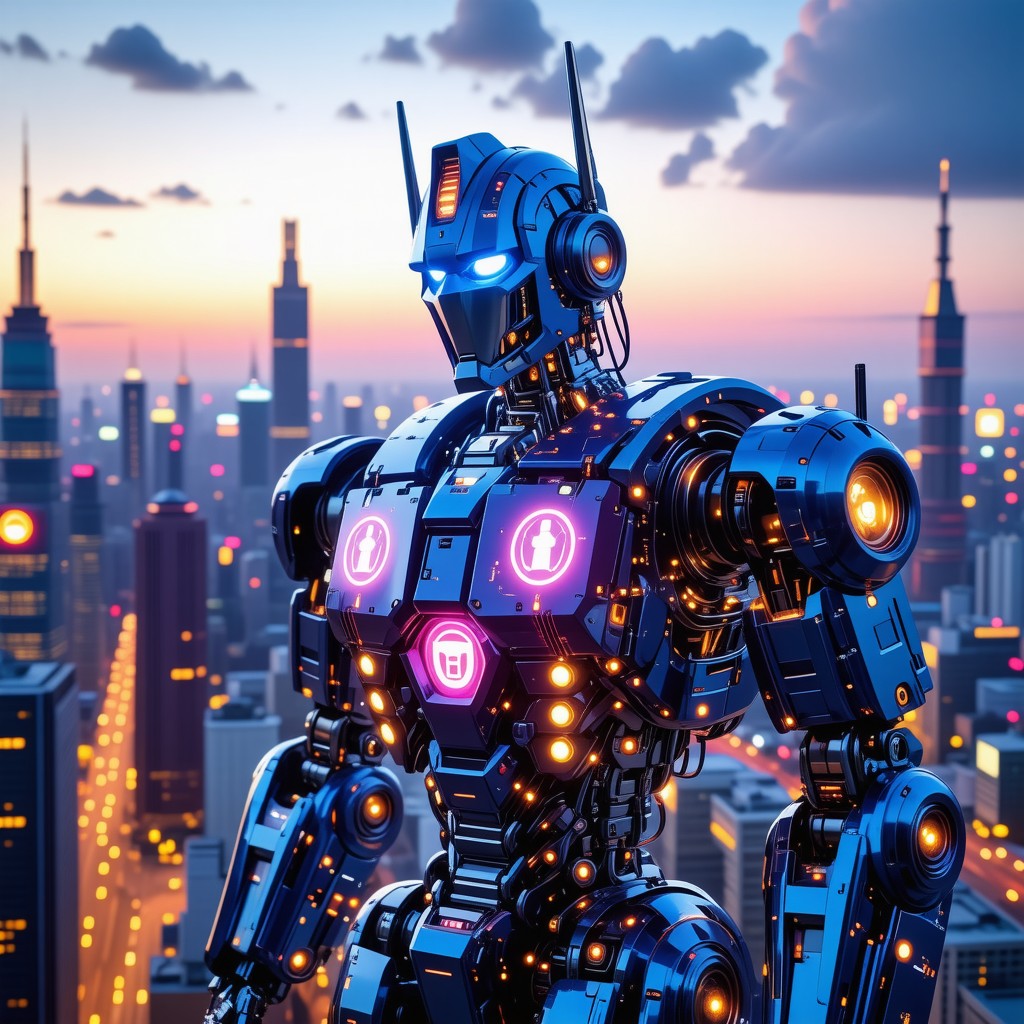Key Takeaways
- Autobot AI Enhances Efficiency: This advanced AI platform uses machine learning to streamline operations, offering tailored automation solutions.
- Safe AI Bot Usage: Understanding the limitations and privacy risks associated with AI bots is crucial for ensuring user safety.
- Career Opportunities Abound: The growing Autobot AI sector is creating diverse job roles, from AI developers to ethics consultants, for tech-savvy individuals.
- Integration and Scalability: Autobot AI can seamlessly integrate with existing systems and scale with business growth, making it ideal for various organizations.
- Free AI Bots Available: Options like ChatGPT and Google Assistant provide accessible AI solutions for users without financial commitment.
Welcome to our deep dive into Autobot AI, where we unravel the fascinating world of AI bots, their safety, and their intriguing connection to the iconic Optimus Prime. In this article, we will explore the fundamentals of Autobot AI, tracing its evolution and significance in modern technology. We’ll also address pressing questions such as, Is there a free AI bot? and Are AI bots safe to use?, providing insights into the various options available, including the Autobot Air Jet Lite and its competitors. Furthermore, we will delve into the cultural impact of AI bots like Optimus Prime, examine Elon Musk’s AI bot initiatives, and discuss career opportunities within the Autobot AI sector. Join us as we navigate through the innovative landscape of Autobot AI and uncover the future of AI technology, from Autobot aircraft carriers to transformer Autobot airships.
Understanding the Basics of Autobot AI
Autobot AI is an advanced artificial intelligence platform designed to enhance operational efficiency through intelligent automation. Unlike traditional automation tools, Autobot AI leverages machine learning and predictive analytics to anticipate user needs and streamline workflows.
Key Features of Autobot AI
- Context-Aware Automation: By analyzing real-time data and security insights, Autobot AI provides tailored automation solutions that adapt to changing circumstances, ensuring proactive responses to potential threats.
- Task Optimization: Autobot AI not only automates repetitive tasks but also optimizes them by learning from user interactions and feedback, leading to improved accuracy and efficiency over time.
- Integration Capabilities: The platform can seamlessly integrate with various applications and systems, enhancing its functionality and allowing for a more cohesive operational environment.
- User-Centric Design: Autobot AI is designed with the end-user in mind, featuring intuitive interfaces that simplify complex processes and enhance user experience.
- Scalability: As organizations grow, Autobot AI can scale its capabilities to meet increasing demands, making it a versatile solution for businesses of all sizes.
Recent studies highlight the importance of AI in operational security, showing that organizations utilizing predictive analytics experience a significant reduction in security breaches (Source: National Institute of Standards and Technology). By implementing Autobot AI, businesses can not only automate tasks but also gain valuable insights that drive strategic decision-making.
The Evolution of AI Bots in Modern Technology
The evolution of AI bots has been remarkable, transforming from simple automated responses to sophisticated systems capable of complex interactions. This progression has been driven by advancements in machine learning, natural language processing, and user experience design.
AI bots, including Autobot AI, are now integral to various sectors, enhancing customer service, streamlining operations, and providing valuable data insights. As technology continues to advance, the capabilities of AI bots will expand, offering even more innovative solutions for businesses.

What is Autobot AI?
Understanding the Basics of Autobot AI
Autobot AI represents a significant advancement in artificial intelligence technology, designed to automate various tasks and enhance user interactions across multiple platforms. This innovative technology utilizes machine learning algorithms to understand user inputs and provide intelligent responses, making it an essential tool for businesses looking to streamline communication and improve customer engagement. By integrating features such as automated responses and workflow automation, Autobot AI can effectively manage user inquiries, thereby reducing the need for constant human oversight.
The Evolution of AI Bots in Modern Technology
The journey of AI bots, including Autobot AI, has been remarkable. Initially, bots were simple programs that could perform basic tasks. However, with advancements in natural language processing and machine learning, today’s AI bots can engage in complex conversations and provide personalized experiences. This evolution has led to the emergence of various applications, from customer service bots to sophisticated trading systems. For instance, the future of bots in trading showcases how AI technology is reshaping industries by offering real-time analytics and decision-making capabilities.
Is there a free AI bot?
Exploring Free AI Bot Options
Yes, there are several free AI bots available that can assist users in various tasks. Here are some notable options:
- ChatGPT by OpenAI: This AI model can engage in conversations, answer questions, and provide information on a wide range of topics. It is accessible for free through various platforms, including OpenAI’s website.
- Google Assistant: A virtual assistant powered by AI, Google Assistant can perform tasks, answer queries, and control smart devices. It is available for free on Android devices and through the Google Home app.
- Microsoft’s Azure Bot Service: While primarily a platform for developers, Microsoft offers a free tier that allows users to create and interact with AI bots for various applications.
- Replika: This AI chatbot is designed for companionship and conversation. Users can chat with Replika for free, making it a popular choice for those seeking a conversational partner.
- Messenger Bots: Facebook Messenger hosts various bots that can provide customer service, entertainment, and information. Many of these bots are free to use and can be found within the Messenger app.
These AI bots leverage natural language processing and machine learning to provide users with interactive and informative experiences. For more detailed information on AI bots and their functionalities, you can refer to sources like OpenAI, Google AI, and Microsoft Azure.
Comparing Autobot AI Pricing with Competitors
When considering AI solutions, it’s essential to evaluate pricing structures. Autobot AI offers competitive pricing compared to other AI bots in the market. For instance, while some platforms like Brain Pod AI provide robust features at various price points, Autobot AI aims to deliver value through its comprehensive functionalities without breaking the bank. Understanding the pricing landscape can help businesses choose the right AI solution that fits their budget and operational needs. For more insights into pricing, you can check out the pricing page for detailed comparisons.
What is Autobot AI?
Autobot AI represents a significant leap in the realm of artificial intelligence, specifically designed to enhance automation and streamline processes across various sectors. By leveraging advanced algorithms and machine learning, Autobot AI systems can perform tasks ranging from customer service interactions to complex data analysis, making them invaluable tools in today’s digital landscape.
Understanding the Basics of Autobot AI
At its core, Autobot AI utilizes sophisticated programming to mimic human-like interactions, enabling businesses to automate responses and improve user engagement. This technology is particularly effective in environments where real-time communication is essential, such as social media platforms and customer support channels. With features like automated responses and workflow automation, Autobot AI can significantly reduce the workload on human operators while maintaining high levels of customer satisfaction.
The Evolution of AI Bots in Modern Technology
The journey of AI bots, including Autobot AI, has been marked by rapid advancements in technology. Initially, bots were limited to simple task automation, but with the advent of machine learning and natural language processing, they have evolved into complex systems capable of understanding context and nuance in conversations. This evolution has paved the way for innovative applications, such as the Autobot Air Jet Lite, which showcases how AI can enhance operational efficiency in various industries, including aviation and logistics.
As AI technology continues to advance, the integration of Autobot AI into everyday applications will likely expand, offering even more sophisticated solutions for businesses and consumers alike. The future of AI bots, including those like the Autobot Air Force 1 and Autobot Air Guardian Jetfire, promises to redefine how we interact with technology, making it more intuitive and responsive to our needs.
Are AI Bots Safe to Use?
AI bots can be safe to use, but there are important considerations to keep in mind to ensure your privacy and security. Here are key points to consider:
- Data Privacy Risks: Sharing personal information with AI chatbots can lead to significant risks. If a chatbot’s database is compromised, malicious actors could exploit your data for identity theft, stalking, or profiling. Even seemingly innocuous details can be aggregated to create a comprehensive profile that could be used against you. According to a report by Norton, it is crucial to avoid sharing sensitive information such as your full name, address, or financial details with AI bots.
- Understanding Bot Limitations: AI bots, including those used in messaging platforms, are designed to assist users but have limitations. They may not always provide accurate information or understand context fully. It’s essential to approach interactions with AI bots critically and verify any important information through reliable sources.
- Use of Secure Platforms: When interacting with AI bots, ensure that you are using secure and reputable platforms. For instance, if you are using a Messenger Bot, check the privacy policies and security measures in place. Reputable platforms often have robust security protocols to protect user data.
- Educate Yourself on AI Technology: Understanding how AI bots operate can enhance your safety. Familiarize yourself with the technology behind these bots, including how they process data and the potential vulnerabilities they may have. Resources like the Electronic Frontier Foundation provide valuable insights into AI and privacy.
- Stay Informed About Updates: The landscape of AI technology is constantly evolving. Stay updated on the latest trends and best practices for using AI safely. Following reputable tech news outlets and cybersecurity blogs can help you remain informed about potential risks and safety measures.
Best Practices for Using AI Bots Securely
To maximize safety while using AI bots, consider implementing the following best practices:
- Limit Personal Information: Avoid sharing unnecessary personal details with AI bots. Stick to general inquiries and refrain from providing sensitive data.
- Use Strong Passwords: Ensure that any accounts associated with AI bots are protected with strong, unique passwords. This adds an extra layer of security against unauthorized access.
- Regularly Review Privacy Settings: Check the privacy settings of the platforms you use to interact with AI bots. Adjust them according to your comfort level regarding data sharing.
- Report Suspicious Activity: If you encounter any suspicious behavior from an AI bot, report it to the platform immediately. This helps maintain a safer environment for all users.
- Engage with Trusted Bots: Stick to well-known and reputable AI bots, such as those offered by Messenger Bot, which prioritize user security and privacy.

Autobot AI Careers
The field of autobot ai is rapidly expanding, creating a wealth of career opportunities for those interested in artificial intelligence and automation. As businesses increasingly adopt AI technologies, the demand for skilled professionals in this sector is on the rise. Here’s a closer look at the career landscape within the autobot ai domain.
Career Opportunities in the Autobot AI Sector
- AI Developer: Focused on creating and optimizing autobot ai systems, AI developers work on algorithms and machine learning models that enhance bot performance.
- Data Scientist: These professionals analyze data to improve AI functionalities, ensuring that autobot ai systems can learn and adapt effectively.
- AI Trainer: Responsible for training AI models, AI trainers curate datasets and refine algorithms to improve the accuracy of autobot ai responses.
- Product Manager: Overseeing the development of autobot ai products, product managers coordinate between technical teams and stakeholders to ensure alignment with market needs.
- AI Ethics Specialist: As AI technologies evolve, the role of ethics in AI becomes crucial. Specialists focus on ensuring that autobot ai applications adhere to ethical standards and regulations.
Skills Required for Success in Autobot AI Roles
To thrive in the autobot ai sector, candidates should possess a mix of technical and soft skills:
- Programming Proficiency: Knowledge of programming languages such as Python, Java, or C++ is essential for developing autobot ai systems.
- Machine Learning Expertise: Understanding machine learning algorithms and frameworks is crucial for creating effective AI models.
- Analytical Skills: The ability to analyze data and derive insights is key for roles like data scientists and AI trainers.
- Communication Skills: Effective communication is vital for collaborating with teams and explaining complex AI concepts to non-technical stakeholders.
- Problem-Solving Abilities: A strong aptitude for problem-solving helps professionals navigate challenges in AI development and deployment.
Autobot AI Careers
The field of Autobot AI is rapidly expanding, creating a wealth of career opportunities for those interested in artificial intelligence and automation. As businesses increasingly adopt AI technologies, the demand for skilled professionals in this sector continues to grow. From software developers to data scientists, various roles are emerging that focus on the development and implementation of AI systems.
Career Opportunities in the Autobot AI Sector
In the Autobot AI sector, numerous career paths are available, including:
- AI Developer: Responsible for creating and maintaining AI algorithms and systems.
- Data Scientist: Analyzes data to improve AI performance and inform decision-making.
- Machine Learning Engineer: Designs and implements machine learning models that enable bots to learn from data.
- AI Researcher: Conducts studies to advance the field of AI and develop innovative solutions.
- Product Manager: Oversees the development of AI products, ensuring they meet market needs and user expectations.
These roles often require a strong background in computer science, mathematics, and experience with programming languages such as Python or Java. Additionally, familiarity with AI frameworks and tools is essential for success in these positions.
Skills Required for Success in Autobot AI Roles
To thrive in Autobot AI careers, individuals should cultivate a diverse skill set, including:
- Programming Skills: Proficiency in languages like Python, R, or Java is crucial for developing AI applications.
- Data Analysis: The ability to interpret and analyze data sets to inform AI model development.
- Machine Learning Knowledge: Understanding machine learning algorithms and their applications in AI.
- Problem-Solving Skills: The capacity to tackle complex challenges and devise innovative solutions.
- Communication Skills: Effectively conveying technical concepts to non-technical stakeholders is vital.
As the Autobot AI landscape evolves, continuous learning and adaptation will be key to staying relevant in this dynamic field. For those interested in exploring AI careers further, resources like Brain Pod AI offer valuable insights and training programs tailored to aspiring AI professionals.
Autobot AI Careers
The field of autobot ai is rapidly expanding, creating numerous career opportunities for individuals interested in artificial intelligence and automation. As businesses increasingly adopt AI technologies, the demand for skilled professionals in this sector is on the rise. From developers to data scientists, various roles are emerging that cater to different skill sets and interests.
Career Opportunities in the Autobot AI Sector
There are several key career paths within the autobot ai sector, including:
- AI Developer: Focuses on designing and implementing AI algorithms and systems, often requiring proficiency in programming languages such as Python and Java.
- Data Scientist: Analyzes and interprets complex data to help organizations make informed decisions, leveraging machine learning techniques.
- AI Trainer: Responsible for training AI models using large datasets, ensuring that the bots can learn and adapt effectively.
- Product Manager: Oversees the development and deployment of AI products, ensuring they meet market needs and align with business goals.
- AI Ethics Consultant: Works to ensure that AI technologies are developed and used responsibly, addressing ethical concerns related to bias and privacy.
These roles not only offer competitive salaries but also the chance to work on innovative projects that shape the future of technology.
Skills Required for Success in Autobot AI Roles
To thrive in the autobot ai industry, candidates should possess a combination of technical and soft skills, including:
- Programming Skills: Proficiency in languages such as Python, R, and Java is essential for developing AI applications.
- Machine Learning Knowledge: Understanding machine learning algorithms and frameworks is crucial for creating effective AI solutions.
- Analytical Thinking: The ability to analyze data and derive actionable insights is vital in this data-driven field.
- Problem-Solving Skills: Creative problem-solving abilities are necessary to tackle complex challenges in AI development.
- Communication Skills: Strong verbal and written communication skills are important for collaborating with teams and presenting ideas clearly.
As the autobot ai landscape continues to evolve, ongoing education and skill development will be key to staying competitive in this dynamic field. For those interested in pursuing a career in AI, exploring training programs and resources can provide a solid foundation for success.




